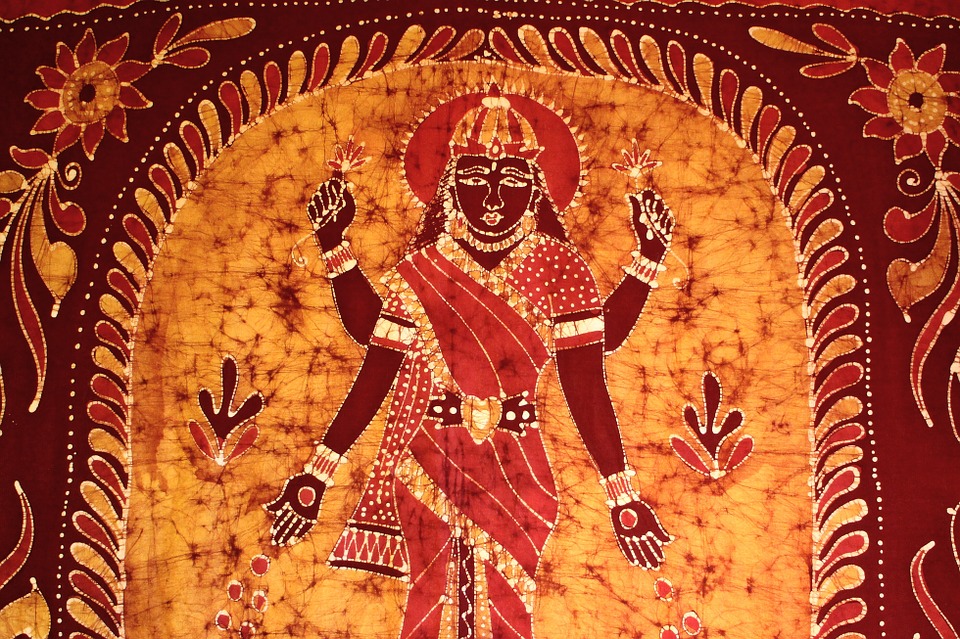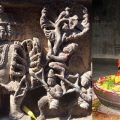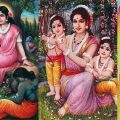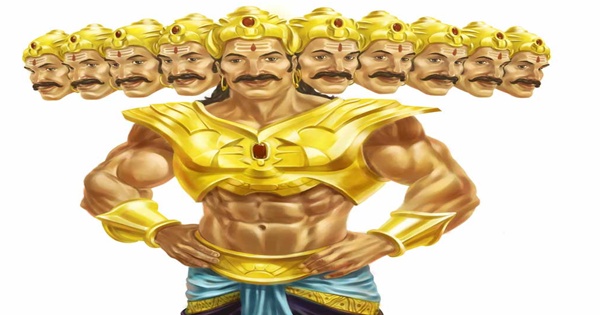Surpanakha: Beautiful in Form, Ugly in Character; What Vālmiki Rāmayana Reveals
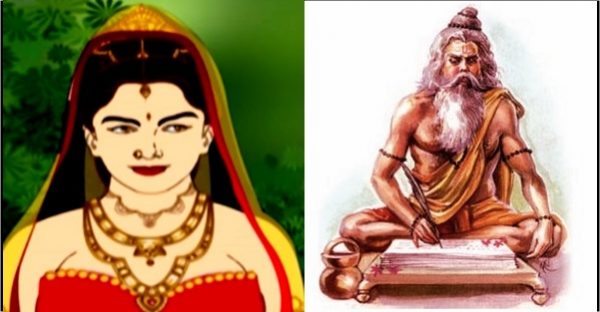
Ugliness in physical form doesn’t imply ugliness in character. Beauty in physical form doesn’t imply beauty in character. A close reading of Vālmiki Rāmayana reveals that Vālmiki has described Surpanakha as beautiful in appearance but ugly in character. The word ‘Surpa-nakha’ means, the one with big nails (a typical fashion trend among many of today’s feminist women).
The confusion of the ugliness of Surpanakha is due to the biased understanding many translators have about Rākshasas. The word ‘Rākshasa’ originally had a positive meaning viz.:- protectors, from the word ‘Raksha’ – protection, much like the word ‘Kshatriya’ is derived from ‘Kshatra’ (area, field, territory or region). Like the Kshatriyas, the Rākshasas too were the protectors of territory. The change of meaning from positive to negative or negative to positive is quite common in the long history of Samksrit language. Another derivative of ‘Kshatra’ viz. ‘Kshetriya’ took a negative meaning viz. ‘hereditary disease’, as in Atharvaveda (kṣetriyāt tvā nirṛtyā jāmiśaṃsād druho muñcāmi varuṇasya pāśāt –avs.2.10.1a) while its original meaning was much like Kshatriya, viz. related to a field (Kshatra).
The word Asura was a honorific used even by Indra, found as such in RgVeda, but later in Puranas meant the bad guys (viz. Daityas and Danavas, the ancient cousins of the Adityas, who later parted ways from them, moving westward, occupying today’s Pakistan and later Iran, speaking Avestan and later Persian, evolving a religion of their own viz. Zoroastrianism from which Abrahamism arose (later in the Semitic region).
Similarly the Pishāchas of Kashmir Valley, too were later demonized. Originally ‘Pishācha’ meant yellow skinned or pale skinned, indicating the pale skinned inhabitants of Kashmir (pish: yellow, tawny, reddish-yellow, yellowish-brown or reddish; pitha: yellow) Then they were treated as flesh-eaters (Pishitaa-shanas) and the darkness of their character got attributed into their skin color so that in many Puranas they were called dark skinned.
Due to this confusion, words like Kāmarupini which used to describe the shape of Surpanakha is interpreted as ‘one who can choose any desired form at will, but its original meaning was ‘of desirable / beautiful form’
tena tatraiva vasatā janasthānanivāsinī
virūpitā śūrpaṇakhā rākṣasī kāmarūpiṇī
Almost all our goddesses like Durga, Lakshmi and Sarasvati are described as Kāmarupini in our ancient Samskrit texts, always meaning ‘of beautiful / desirable form’ and never as ‘shape shifters’.
Other words that used to describe Surpanakha are manojñāngī (‘having organs agreeable to mind’, used by Rāma to describe her, in some versions of Vālmiki Rāmayana).
Rāma to Supranakha:-
tvām tu veditum icchhāmi kasya tvam kā asi kasya vā ?
tvam hi tāvan manojñāṁgī rākṣasī pratibhāsi me
I wish to know about you. Whose (wife) are you? Who are you? Whose (daughter) are you? You are having organs agreeable to mind, and so apparently must be a Rākshasi.
Surpanakha replies, I am Supranakha by name, Rākshasi of beautiful form. (ahaṃ śūrpaṇakhā nāma rākṣasī kāmarūpiṇī).
The wordplay using words like virūpā etc are actually used to denote dislike and hatred. For example Surpananakha calls Sīta as vikrtā (disfigured, disoriented), virūpā (ugly), asatī (untruthful), karālā (terrible, devilish), nirṇatodarī (hallow-stomached), etc:-
vikṛtā ca virūpā ca na seyaṃ sadṛśī tava
aham evānurūpā te bhāryā rūpeṇa paśya mām
Unlovely and unshapely is she (Sīta), who is no match for you. I am the lone match for you in form, hence see me as your wife.
imāṃ virūpām asatīṃ karālāṃ nirṇatodarīm
anena saha te bhrātrā bhakṣayiṣyāmi mānuṣīm
This disfigured, dishonest, hallow stomached, devilish woman (Sīta) along with that brother of yours (Lakshmana), I will consume.
All of these words of verbal abuse Surpanakha uses against Sīta, due to her hatred and jealousy towards Sīta who is otherwise described as one of the most beautiful women who lived then on earth. Thus we see an example of how a disliked person can be described as ugly looking, even if the person is of agreeable physical attributes.
In response to the abuse of Sīta by Surpanakha, Rāma replies:-
kṛtadāro ‘smi bhavati bhāryeyaṃ dayitā mama
vadvidhānāṃ tu nārīṇāṃ suduḥkhā sasapatnatā
Oh, honorable one, I am married and this is my dear wife (Sīta), thus it will be distressing for your sort of females to live with a co-wife.
Other words used to describe Surpanakha are madirekṣaṇā (she with intoxicating eyes), viśālākṣi (wide eyed), varavarṇinī (best complexioned one), kamalavarṇinī (she of the hue of a lotus), amalavarṇinī (she of unblemished complexion), varārohi (she with best waist). All of these indicates the physical beauty of Surpanakha.
Surpanakha is also described as virūpā (ugly), asatī (untruthful), karālā (terrible) nirṇatodarī (hallow-stomached), mahodarī (big-stomached), etc. in negative way only as an attribution of her bad character and bad manners transposed upon her form in response to the verbal abuse she showered upon Sīta.
The reason why Lakshmana cut the nose and ears of Surpanakha and made her virūpā (disfigured) is because she called Sīta as virūpā, asatī, karālā, nirṇatodarī etc multiple times and tried to attack and kill her.
Here is the entire account:-
After clarifying that Sīta is his dear wife, Rāma in jest ask Surpanakha to try her luck with his brother Lakshmana, probably to ward her off from Sīta who felt uncomfortable with the advances of Surpanakha towards her husband.
anujas tv eṣa me bhrātā śīlavān priyadarśanaḥ
śrīmān akṛtadāraś ca lakṣmaṇo nāma vīryavān
apūrvī bhāryayā cārthī taruṇaḥ priyadarśanaḥ
anurūpaś ca te bhartā rūpasyāsya bhaviṣyati
enaṃ bhaja viśālākṣi bhartāraṃ bhrātaraṃ mama
asapatnā varārohe merum arkaprabhā yathā
He is my younger brother named Lakshmana, he is with a good conduct, good looking, a promising and valiant one, and he is without a wife. He is without a wife and in need of a wife he is youthful, good-looking and he can become a fitly husband of yours, fit enough to your kind of features. You woo him, oh, wide eyed one, this brother of mine as your husband like sunshine seeking Mēru, then oh, you of great waist, and you will be without a co-wife.
When Rāma clearly told this to that Rākshasi dazed in lust, she discarded Rāma and spoke to Lakshmana. (iti rāmeṇa sā proktā rākṣasī kāmamohitā | visṛjya rāmaṃ sahasā tato lakṣmaṇam abravīt).
Surpanakha to Lakshmana:-
asya rūpasya te yuktā bhāryāhaṃ varavarṇinī
mayā saha sukhaṃ sarvān daṇḍakān vicariṣyasi
I, with my best complexion will be your deserving wife befitting to you charm, you can happily take a trip all over Dandaka forest along with me.
Lakshmana to Surpanakha:-
kathaṃ dāsasya me dāsī bhāryā bhavitum icchasi
so ‘ham āryeṇa paravān bhātrā kamalavarṇinī
samṛddhārthasya siddhārthā muditāmalavarṇinī
āryasya tvaṃ viśālākṣi bhāryā bhava yavīyasī
etāṃ virūpām asatīṃ karālāṃ nirṇatodarīm
bhāryāṃ vṛddhāṃ parityajya tvām evaiṣa bhajiṣyati
ko hi rūpam idaṃ śreṣṭhaṃ saṃtyajya varavarṇini
mānuṣeṣu varārohe kuryād bhāvaṃ vicakṣaṇaḥ?
How you wish to become a female servant, oh, lotus-colored one, by becoming the wife of a servant like me? I am just a vassal of my adorable brother. Oh, wide eyed one, befitting to your blemish-less complexion, you better become the wife of my brother Rāma who is abounding in means, and on becoming the younger wife of that adorable one, you too will achieve your means and thus you will be happy. On discarding her who is disfigured, untruthful, devilish, hallow-stomached, old wife (viz. Sīta) that Rāma will adore you alone. (This is a rhetoric to Shurpanakha’s own abusive words describing Sīta, a few moments before). Oh, best complexioned one having the best waist, is there any wise men to simply discard your kind of great beauty, indeed, in preference to human females?
Then Surpanakha who is agitated by lust said to Rāma who is sitting in the Parnashāla (cottage) along with Sīta (sā rāmaṃ parṇaśālāyām upaviṣṭaṃ paraṃtapam | sītayā saha durdharṣam abravīt kāmamohitā):-
imāṃ virūpām asatīṃ karālāṃ nirṇatodarīm
vṛddhāṃ bhāryām avaṣṭabhya na māṃ tvaṃ bahu manyase
adyemāṃ bhakṣayiṣyāmi paśyatas tava mānuṣīm
tvayā saha cariṣyāmi niḥsapatnā yathāsukham
Tenacious of her who is disfigured, untruthful, devilish, hallow-stomached old wife of yours you are not giving importance to me. Now I wish to consume this human female right before your very eyes, and then I can happily make merry along with you, without worrying about a co-wife.
Speaking that way she that torch-eyed Surpanakha dashed towards the deer-eyed Sīta as a great meteor would dash towards star Rohini. (ity uktvā mṛgaśāvākṣīm alātasadṛśekṣaṇā | abhyadhāvat susaṃkruddhā maholkā rohiṇīm iva). Then Rāma took offense and checking her who is like the noose of death swooping down on Sīta said to Lakshmana. (tāṃ mṛtyupāśapratimām āpatantīṃ mahābalaḥ | nigṛhya rāmaḥ kupitas tato lakṣmaṇam abravīt):-
krūrair anāryaiḥ saumitre parihāsaḥ kathaṃ cana
na kāryaḥ paśya vaidehīṃ kathaṃ cit saumya jīvatīm
imāṃ virūpām asatīm atimattāṃ mahodarīm
rākṣasīṃ puruṣavyāghra virūpayitum arhasi
Lakshmana said things in jest, but this cruel and anārya (uncultured) one took it otherwise. Oh, Saumitri, watch this gentle Vaidehi, still alive (not yet harmed). She is ugly, untruthful and overtly lustful and big-stomached oh, tiger among men, this Rākshasi deserved to be defaced.
Thus said to that mighty Lakshmana he infuriatingly drew sword and chopped off her ears and nose before the very eyes of Rāma. (ity ukto lakṣmaṇas tasyāḥ kruddho rāmasya paśyataḥ | uddhṛtya khaḍgaṃ ciccheda karṇanāsaṃ mahābalaḥ) On hewing off her ears and nose she that terrible Surpanakha blared highly and discordantly, and very speedily fled into forest as she came. (nikṛttakarṇanāsā tu visvaraṃ sā vinadya ca | yathāgataṃ pradudrāva ghorā śūrpaṇakhā vanam).
Instead of reading Vālmiki Rāmayana in originals the media and Leftist intellectuals are trying to project Surpanakha as a ‘victim of patriarchy’ whereas as per all accounts of the story, she was the aggressor and almost a female-rapist.
Featured image courtesy: YouTube and stayreading.com.
Disclaimer: The views expressed here are solely of the author. My India My Glory does not assume any responsibility for the validity or information shared in this article by the author.

